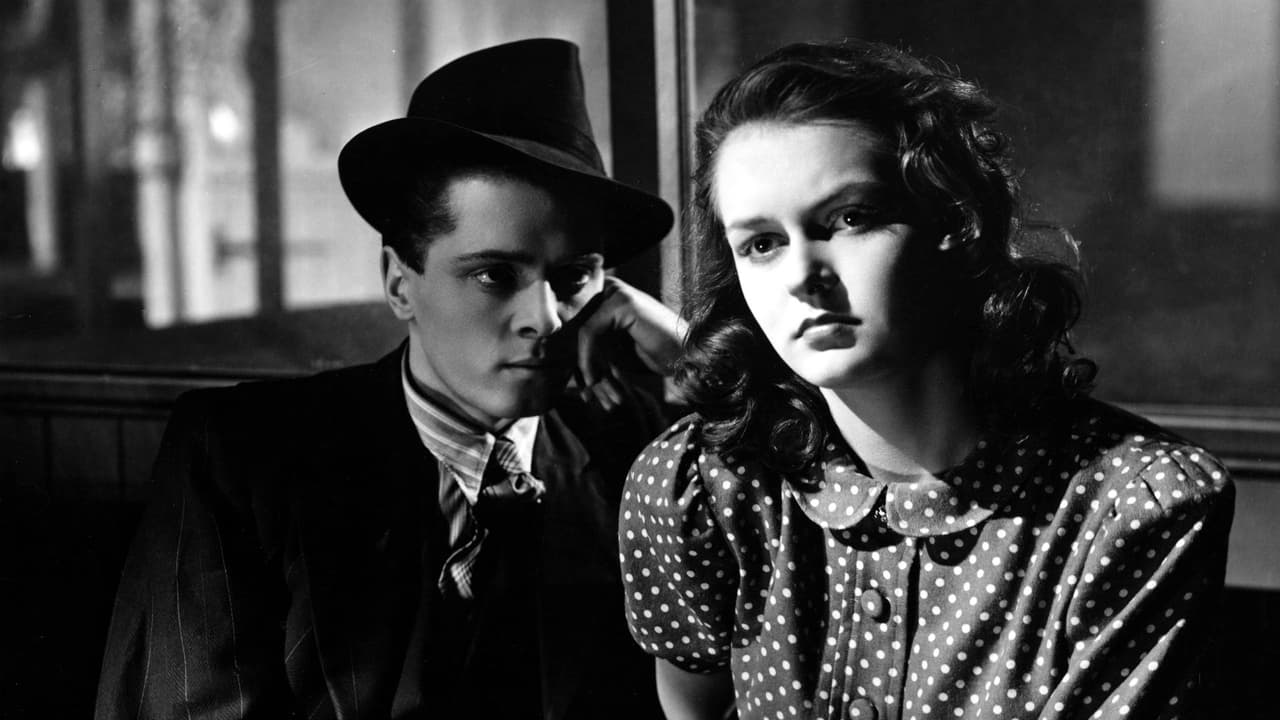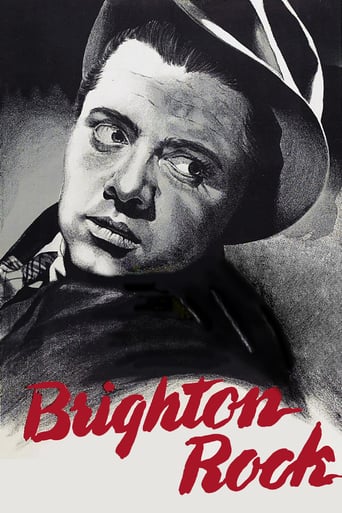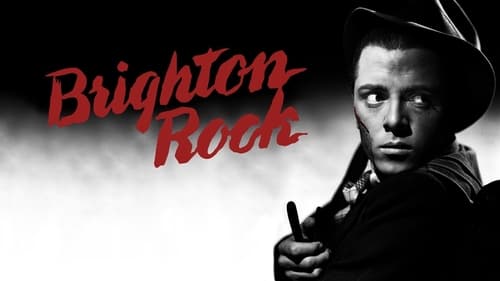Linbeymusol
Wonderful character development!
Nonureva
Really Surprised!
Bluebell Alcock
Ok... Let's be honest. It cannot be the best movie but is quite enjoyable. The movie has the potential to develop a great plot for future movies
Sameer Callahan
It really made me laugh, but for some moments I was tearing up because I could relate so much.
seymourblack-1
This movie is famous for the tough and uncompromising way in which it depicts the types of gangsterism that were prevalent in Brighton in the period between the two world wars. Based on Graham Greene's classic novel of the same name, "Brighton Rock" is a story about revenge, murder and Catholic guilt but most of all; it's about a troubled young gang leader and the action he takes to deal with a series of problems. Threats that emanate from the existence of a more powerful rival gang, dissent within his own gang and a potential witness whose evidence could get him executed are just a few of his concerns but then as a Roman Catholic, he's also sharply aware of where his violent journey is taking him and tormented by his inability to change course.Pinkie Brown (Richard Attenborough) is the new leader of a small gang whose original leader (William Kite) was killed following the publication of a newspaper article written by journalist Fred Hale (Alan Wheatley). One of the gang recognises Hale's picture in "The Daily Messenger" in a section that advertises a promotion that the paper is due to carry out in Brighton in the next few days in which Hale, operating under the name Kolley Kibber, will be handing out cash prizes to people who recognise him. When this piece of information is drawn to the attention of Pinkie, he becomes determined to take revenge on Hale for bringing about the death of the only person he really cared about.During the gang's pursuit of Hale through the streets and pubs of Brighton, the terrified journalist tries to befriend some women including a seaside entertainer called Ida Arnold (Hermione Baddeley) in the hope that being in their company might offer him some protection. Eventually, however, he tries to keep out of sight on a ghost train but is horrified to suddenly find Pinkie sitting next to him. By the time the train reaches the end of its journey, it's carrying one passenger less than it started with and Hale's body is washed up on the shore some hours later.As part of his promotional work, Hale had distributed a number of cards around the resort and in an effort to provide himself with an alibi for the time of the murder, Pinkie arranges for gang member Spicer (Wylie Watson) to carry on delivering the Kolley Kibber cards after Hale's death. Pinkie is later alarmed to discover that Spicer had left a card at a local café and becomes very anxious about the possible consequences if he was seen doing so. In order to try to safeguard himself, Pinkie goes to the café and befriends a young waitress called Rose (Carol Marsh) who has a very clear memory of the man who left the card at one of her tables.Ida Arnold is very suspicious about the circumstances surrounding Hale's death and becomes determined to see that the culprit is brought to justice. Pinkie's continuing efforts to cover up his crime lead to him killing Spicer and marrying Rose to ensure that, as his wife, she won't be able to give evidence against him. Things continue to get more difficult for Pinkie for a variety of reasons and lead him to decide that another killing is necessary but the events that follow don't pan out as he'd planned.As well as being notable for its realism, "Brighton Rock" also features a collection of memorable characters, top class dialogue and some superb expressionistic cinematography that contributes so much to the grim atmosphere of the piece. Inevitably though, it's the character Pinkie Brown and Richard Attenborough's amazing performance that leaves the most indelible impression on anyone who's seen this film. The very young Attenborough is perfect as the ruthless 17-year-old psychopath whose belief in the existence of Hell is incredibly strong and the contribution of the supporting cast is also consistently good.
jandesimpson
"I never knew the old" Brighton "before the war" with its razor-slashing protectionist race gangs, crooked lawyers and ineffective police. We seldom travelled out of London. "I really got to know it in" those post-war days of safe family holidays by the sea - the excitement of the beach, ice cream sodas on the West Pier, cinemas in the evening.....(No prize for recognising my reference to the opening of the great film that appeared two years later!)Part of my fascination with the 1947 "Brighton Rock" is of course affection for a place I grew to love and know so well during the course of many happy vacations with my parents in those far-off days. I was even drawn to eventually settle in a sort of mini-Brighton complete with Regency squares and balconies and the sound of screaming seagulls, 37 miles along the coast to the east. But I digress.....What particularly surprised me on a recent viewing of the film was not only how well it has worn, but the extreme darkness of its nightmare vision of a gangster-ridden society. For a British film of the late '40's it is unusually violent and shot through with a bleakness that outstrips much of the Hollywood noir of the period. Was there ever a more vicious young thug than Richard Attenborough's enormously effective portrayal of the 17 year old Pinkie Brown who runs his protectionist racket from a seedy backstreet dwelling? Pointless to write at length when so much has already been written. (An excellent user comment on this site from laika-lives says it all). Simply let me record my admiration for the Boulting Brothers, especially John the director, for demonstrating an understanding of pacing and montage that almost equals the best work of the great Carol Reed, particularly in the terrific opening quarter of an hour when the unfortunate and terrified Fred is finally tracked down to meet his doom on the Ghost Train at the end of Palace Pier. They don't seem to do sequences like this with such style any more. A good enough reason, I would have thought, for shunning a recent remake!
nkopie
There was no action and not much substance to it. Attenborough held the same expression (moody) throughout and there was a pathetic female character in it who really epitomised everything I hate about a lot of films made in the black and white period; over-the-top, whiny, clingy and acting completely without passion or skill. I believe the film was supposed to be character-driven but as the main character was more silent than talkative, an audience wouldn't really be able to explore the depths of his persona. Given Attenborough's one expression, I don't think his character had any other sides to his personality. If his character was a word it would be 'monosyllabic'.
yourstruly2010
So much has already been said of this film its pointless to type out the story but this is absolutely without shadow of a doubt the finest British gangster film ever made and one of the greatest British films ever made. Richard Attenborough was very almost typecast as hoodlums and gangsters (the hundred pound window, London belongs to me, boys in brown, dancing with crime) his performance here is not uncagney like (via public enemy) phycotic seething brooding filled with rage fear hate and despair. He seems to bear a grudge against religious and authoritative figures he also appears to be homosexual in one scene he goes berserk to find fellow gang members and their girlfriends drinking and acting flirtatious and promiscuous he even threatens to kill when a fellow gangster says his wife is going to make a man of him on their wedding night and then the next morning after their wedding night he hasn't slept with his wife. his best friend tells her "not to worry hes just busy hes got stuff on his mind" she tells pinkies best friend "i don't want to be on his mind ever i just want be with him" implying she hasn't 'BEEN' with him in fact by the end of the film I'm not sure he has slept with her at all. You can fill in the blanks why does a 17 year old lad wind up this vicious and angry where are his parents what lead him to the place where he is now why the hatred toward religion ? even his nick name pinky brown... you have to wonder ... the relationships hes forged with other members of the gang are quite interesting also the former leader seems to have been somewhat of a father figure to pinky and hes trying to forge that same relationship with Dallow (william hartnel) who is clearly the brains of the outfit and would be the leader of the mob if he wasn't scared of pinky as everyone is he knows fine well what pinky is capable of he gets a good indication in the first few minutes of the film. Pinky isn't used of people standing up to him and not fearing him he doesn't like the fact the town is now increasingly ran by colleani he hates it and the rest of the mob know if it wasn't for pinkies murderous reputation they'd be finished. Pinkies relationship with women also worth noting the only time he shows his wife anything but hostility is when hes hurt and wants mothering.1947 Was the year england took America's crown albeit briefly as the worlds finest producer of gangster films as this They Made Me A Fugitive and Black Memory stormed onto British screens, we had previously had a few films that dealt with small scale gangsters (the man from Chicago) and young hoodlums (bad boy) but we had always been weary of the kind of film America had been producing in fact the British censors blocked an attempt to produce a screen version of the play The Blue Cafe which dealt with organised crime in London's seedy Soho district and No Orchids For Mss Blandish was filmed in America complete with fake American accents but here finally in 1947 we were treat to a reflection of our own homegrown gangsters on screen no there's no ring of tommy gun fire but believe me the violence and sheer darkness of these films are just as gripping intense and shocking.To those who question attenboroughs legitimacy as a 17 year old saying hes unbelievable i say that its a cultural difference here people leave school at 16 (at the earliest) they can leave home get a job and start a family in fact i know people doing that right now and back then people were leaving school at 14 so yes attenboroughs performance is actually a lot more believable than you'd give it credit for.Flat out Masterpiece !!!


